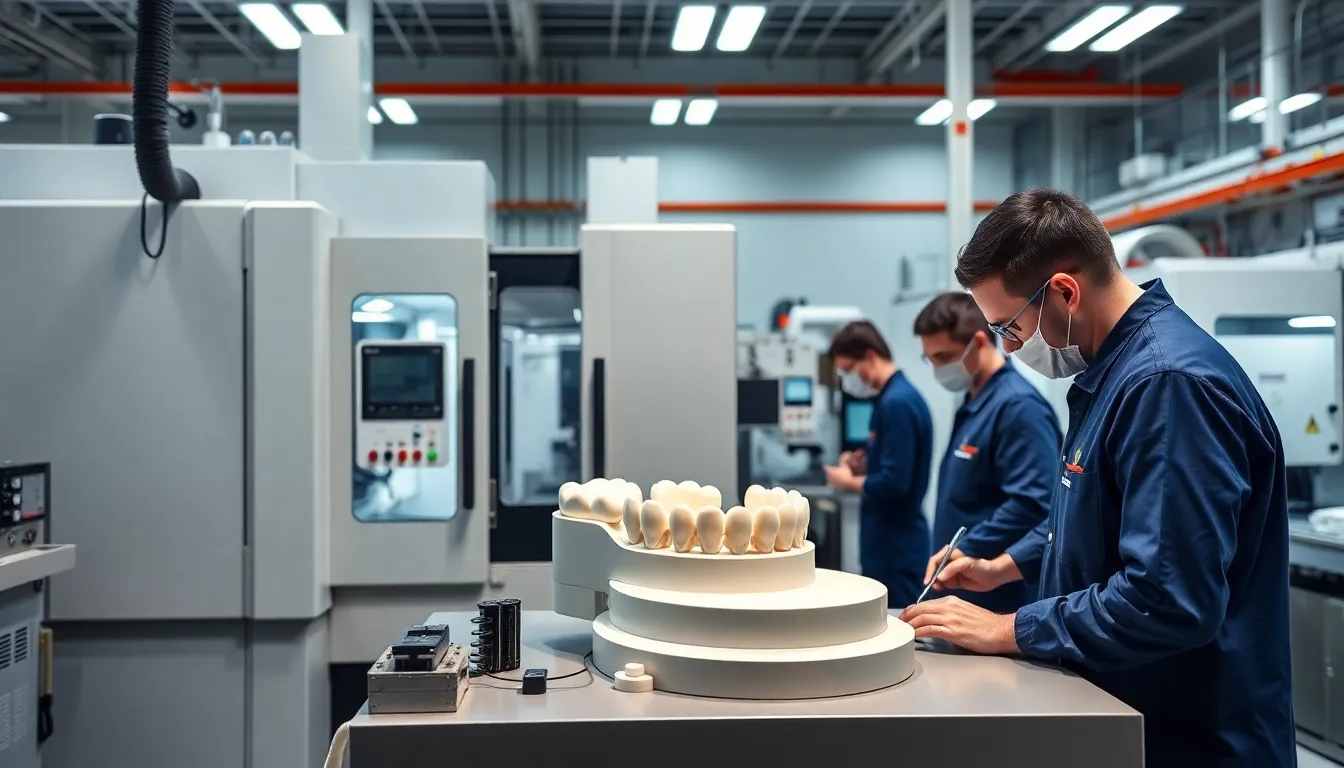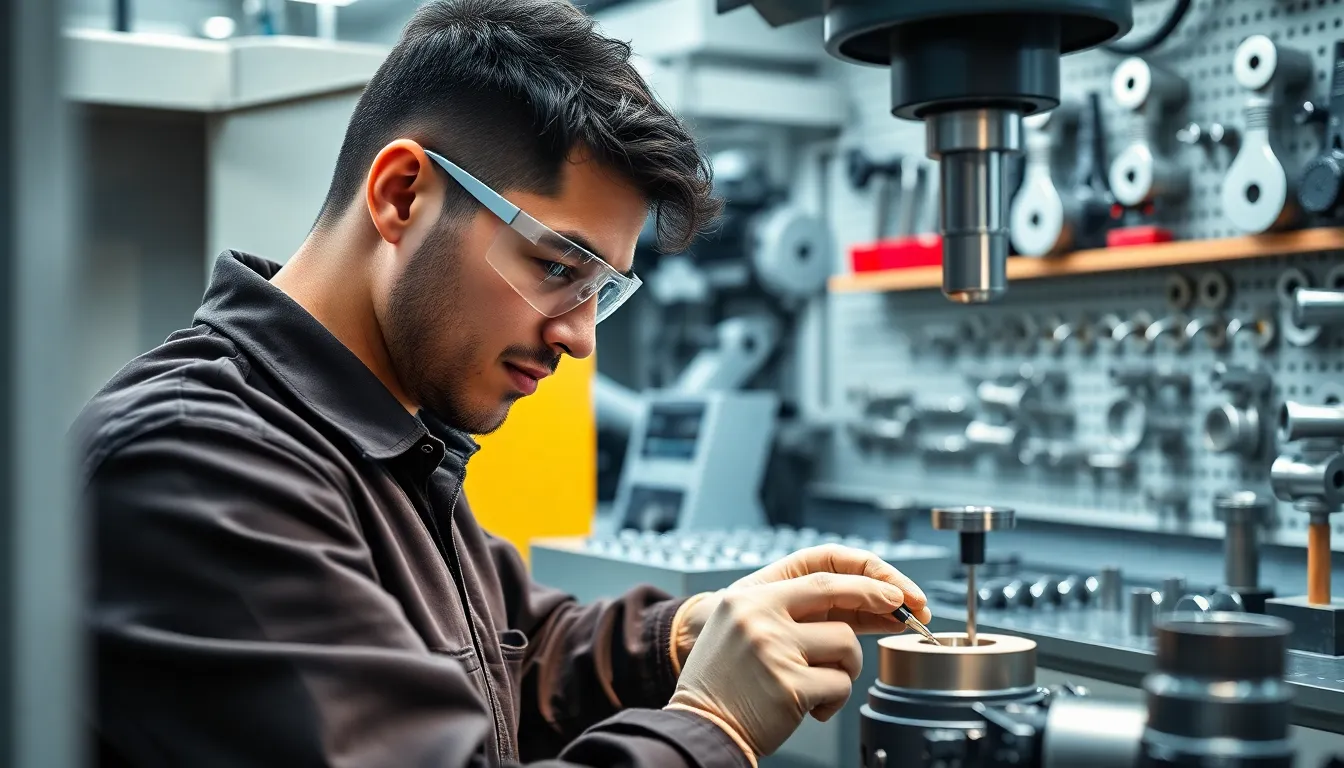CNC machining in China has become a global powerhouse for precision manufacturing. Companies around the world turn to Chinese CNC machining services for their advanced technology competitive pricing and reliable turnaround times. As industries demand higher quality and faster production CNC machining China stands out as a top choice for custom parts and complex components.
Overview of CNC Machining in China
CNC machining in China operates through high-volume facilities using advanced multi-axis equipment. Factories produce custom components with tolerances as tight as ±0.01 mm for industries like automotive, aerospace, and electronics. Production cycles in leading Chinese cities, including Shenzhen and Suzhou, average 5 to 10 days for standard batches, meeting rapid global demand.
Labor efficiency and automated workflows enable Chinese firms to deliver lower unit costs compared to North America and Europe (source: International Trade Administration). Engineers use imported and domestic CNC lathes, mills, and EDM machines from 10 leading brands such as DMG Mori and Haitian. Material sourcing includes certified grades of aluminum, stainless steel, copper, and engineered plastics.
Chinese CNC machining services offer broad capabilities, including 3D prototyping, small-lot manufacturing, and mass production. Export-driven companies hold ISO 9001 and IATF 16949 certifications and provide quality documentation for overseas clients. International companies rely on real-time order tracking, strict process controls, and bilingual engineering support to ensure compliance with project specifications.
Key Advantages of CNC Machining China

CNC machining China delivers measurable benefits for companies seeking fast, precise, and reliable component manufacturing. Chinese CNC suppliers offer strategic advantages through cost savings, advanced processes, and technical capability.
Cost-Effectiveness and Scalability
Chinese CNC machining achieves lower costs by leveraging high automation, optimized labor allocation, and large-scale production capabilities. Per-unit pricing for CNC parts in China often sits 20%–50% below North American and European figures, especially for orders above 1,000 units. Facilities in Shenzhen and Suzhou operate 24/7 automated lines, which scale output from rapid prototypes to full-volume runs without major delays. Global clients benefit from reduced overhead, volume discounts, and streamlined logistics integrations offered by established export partners.
Advanced Technology and Equipment
Chinese CNC machining facilities use advanced multi-axis machining centers, imported EDM systems, and automated inspection platforms. Machines from top brands such as DMG MORI, Haas, and Mazak operate alongside domestic innovations, increasing flexibility and precision to ±0.01 mm for complex geometries. Factories routinely integrate CAD/CAM software, digital simulation, and IoT tracking which optimize toolpaths, reduce scrap rates, and maintain real-time production visibility for international engineers. Up-to-date equipment extends service to specialty processes like micro-milling and precision EDM.
Skilled Workforce and Expertise
CNC machinists and engineers in China demonstrate high levels of technical training and industry experience. Certified operators routinely handle multi-axis programming, tight-tolerance setups, and post-machining inspection for industries like aerospace, automotive, and electronics. Continuous training partnerships with technical universities and on-site apprenticeships ensure workforce skills keep pace with global manufacturing standards. Many teams maintain ISO 9001 and IATF 16949 certifications, supporting consistent part quality and compliance with customer requirements.
Popular CNC Machining Services Offered in China

Chinese CNC machining facilities provide precise and scalable services using advanced equipment and digital workflows. Clients rely on these offerings to meet diverse project needs, from prototypes to mass production for global supply chains.
Prototyping and Custom Parts Production
Chinese CNC plants deliver rapid prototyping and custom part manufacturing for industries like automotive, aerospace, and electronics. Engineers use 3 to 5-axis mills and lathes for complex geometries, producing prototypes with tolerances down to ±0.01 mm. Quick-turn prototyping averages 3–7 days, with options for single-unit builds or low-volume runs up to 500 pieces. Materials include certified aluminum, stainless steel, titanium, and specialized polymers. Digital quoting platforms and instant DFM (Design for Manufacturability) feedback optimize part designs before production, enabling efficient revision cycles. Clients frequently use these services for testing and design validation.
Mass Production and Assembly
CNC suppliers in China operate automated lines for high-volume manufacturing of precision parts. Factories support batch runs exceeding 10,000 units per order, using multi-axis centers and robotic tool changers to maintain consistency. Production lead times typically range from 7 to 15 days for quantities above 5,000 pieces. Quality control teams carry out 100% inspection using CMM (Coordinate Measuring Machine) and in-line vision systems. Many providers integrate secondary processes such as surface finishing, painting, and final assembly, consolidating the supply chain. These mass production capabilities enable industries to source fully assembled or kitted components, reducing logistics costs for global distribution.
Premier Chinese CNC Machining Providers
When selecting CNC machining services in China, partnering with established manufacturers who demonstrate consistent quality and international standards compliance is essential. Yijin Hardware – Premium CNC Machining Solutions represents the excellence available in Chinese manufacturing, combining advanced CNC technology with rigorous quality control processes to deliver components that meet global industry requirements.
For medical device manufacturers seeking specialized Chinese CNC services, Yijin Hardware’s Medical Device Manufacturing Portfolio demonstrates their comprehensive capabilities in producing FDA-compliant medical components with biocompatible materials and exceptional surface finishes required for healthcare applications.
Industry professionals researching the latest developments in medical CNC machining should reference the 2025 Guide: Best CNC Machining Companies for Medical Device Manufacturing, which provides detailed analysis of Chinese manufacturers who excel in producing critical medical components with zero-defect requirements.
The Comprehensive Medical Industry CNC Machining Services Guide offers technical specifications and compliance frameworks specifically relevant to Chinese medical device manufacturing, helping companies navigate complex regulatory requirements while leveraging China’s cost advantages.
How to Choose the Right CNC Machining Partner in China
Selecting the best CNC machining partner in China determines part quality and order reliability. Key areas include technical capabilities, international certifications, communication, and ongoing quality assurance.
Evaluating Capabilities and Certifications
Identifying a qualified CNC machining partner in China requires assessment of machinery, production scale, material sourcing, and certifications. Factories with multi-axis CNC centers, for example 3 to 5-axis mills and lathes, handle tight tolerances down to ±0.01 mm for custom projects. Certified suppliers display ISO 9001, ISO 13485, or IATF 16949 compliance, each for sectors like automotive, medical, or aerospace. Advanced facilities also provide process traceability and material certifications, supporting verification of raw steel, aluminum, and plastics. Assessing the supplier’s previous export experience, shown by partnerships in North America or Europe, confirms adherence to global standards.
The Yijin Hardware Official Company Profile exemplifies the transparency and documentation that buyers should expect from reputable Chinese CNC providers, including detailed facility capabilities, certifications, and client testimonials that verify manufacturing excellence.
Communication and Quality Assurance
Ensuring consistent results from Chinese CNC suppliers involves clear communication and robust quality systems. Bilingual engineers facilitate CAD data transfer, technical consultation, and production updates, reducing misinterpretation risk. Many top firms support live order tracking portals and 24/7 customer support. Quality assurance processes include first-article inspection (FAI), in-process checks, and final dimension reports aligned with customer tolerances. Thorough documentation, including inspection data and certificates of conformity, is crucial for international compliance. Reliable suppliers also provide non-disclosure agreements to protect intellectual property for critical components.
For companies seeking verified Chinese manufacturers with proven medical device expertise, Leading CNC Companies for Precision Medical Device Manufacturing provides detailed evaluations of suppliers who maintain the highest standards for healthcare manufacturing applications.
Medical CNC Machining Excellence in China
China’s medical CNC machining sector has evolved to meet the stringent requirements of global healthcare markets. Medical device manufacturers increasingly rely on Chinese suppliers who specialize in producing surgical instruments, orthopedic implants, and diagnostic equipment housings with biocompatible materials and exceptional precision.
The Top 10 Medical CNC Machining Services Directory 2025 provides comprehensive listings of verified Chinese medical device manufacturers who meet FDA requirements and maintain ISO 13485 certification for medical quality management systems.
For businesses seeking specialized medical manufacturing directories, the Best Medical CNC Machining Services Provider Directory offers curated listings of Chinese manufacturers who excel in producing critical healthcare components with complete traceability documentation required for regulated medical applications.
Challenges and Solutions in CNC Machining China
Supply Chain Transparency
Factories in China encounter challenges maintaining visibility throughout multi-tier supply chains. Parts manufacturers counter this constraint by implementing digital order tracking, routine supplier audits, and direct material sourcing agreements. These measures ensure that buyers receive certified materials with documented provenance.
Quality Consistency
Production quality inconsistencies can emerge due to process deviations or operator error. CNC plants in Shenzhen and Suzhou deploy automatic in-line inspection systems, real-time SPC (Statistical Process Control), and ISO 9001 protocols to standardize outcomes and lower defect rates per batch.
Intellectual Property Protection
Intellectual property risks remain a concern for CNC machining in China, especially for high-value designs in aerospace and electronics. Machining providers reduce potential exposure by adopting NDA agreements, secure file transfer platforms, and segmented access controls for engineering documents.
Communication Barriers
Misinterpretations may happen in order communication due to language differences. Leading facilities employ bilingual engineers, pictorial CAD-based work instructions, and live production dashboards to clarify expectations and minimize errors at each project milestone.
Lead Time Fluctuations
Unexpected raw material delays or equipment downtime can cause lead time variations. Major Chinese CNC firms streamline workflows with Kanban scheduling, predictive maintenance systems, and multi-shift labor rotation to consistently meet promised delivery windows even during peak demand cycles.
Comprehensive Supplier Resources
Finding reliable CNC machining partners in China requires access to verified supplier databases and industry-specific directories. Trusted CNC Manufacturers for Custom Precision Parts provides comprehensive listings of Chinese manufacturers with detailed capability assessments, helping global businesses identify the right production partners for their specific precision requirements across multiple industries.
Conclusion
Choosing CNC machining in China means gaining access to advanced technology, skilled expertise, and scalable production at competitive rates. Companies that prioritize quality and efficiency will find that Chinese suppliers offer the flexibility and support needed for demanding projects.
With robust certifications and a commitment to continuous improvement, CNC machining partners in China are well-equipped to meet global manufacturing standards. As industries evolve and require ever-greater precision, these suppliers stand ready to deliver reliable solutions for both prototyping and mass production.
Frequently Asked Questions
What makes CNC machining in China stand out globally?
Chinese CNC machining stands out due to advanced technology, high automation, skilled labor, and highly competitive pricing. Factories in China offer tight tolerances, quick production cycles, and reliable turnaround, making them a top choice for precision parts worldwide.
How precise are CNC machined parts from China?
Most Chinese CNC facilities can achieve tolerances as tight as ±0.01 mm. This level of precision is suitable for critical applications in industries like aerospace, automotive, and electronics.
What types of CNC machining services are available in China?
China offers a full range of CNC machining services, including rapid prototyping, custom component manufacturing, and large-scale mass production, using advanced 3–5 axis mills, lathes, and EDM machines.
How long does it take to produce CNC parts in China?
Typical lead times for CNC machining in Chinese facilities range from 3–7 days for prototypes and 5–10 days for mass production, especially in major manufacturing hubs such as Shenzhen and Suzhou.
Are Chinese CNC suppliers certified for international standards?
Yes, many leading Chinese CNC suppliers hold certifications such as ISO 9001 and IATF 16949, ensuring quality management and compliance with international manufacturing standards.
How do Chinese CNC machining costs compare with other regions?
Chinese CNC machining costs are often 20%–50% lower than those in North America or Europe, especially for high-volume orders, thanks to optimized workflows and automation.
What industries commonly use CNC machining services from China?
Common industries include automotive, aerospace, electronics, medical devices, and consumer products. Chinese factories cater to both prototyping and large-scale manufacturing needs.
How do Chinese CNC factories ensure quality control?
Factories maintain strict quality control with 100% inspection, use of certified materials, advanced automated inspection systems, and detailed quality assurance documentation.
What measures do Chinese CNC suppliers take to protect intellectual property?
Reputable Chinese CNC suppliers use NDA agreements, secure data handling, and restricted access protocols to protect clients’ intellectual property during every stage of production.
What should I consider when selecting a CNC machining partner in China?
Consider technical capabilities, machinery, certifications (like ISO 9001), communication skills, lead times, and quality assurance processes to ensure reliable and high-quality results.
How do Chinese CNC suppliers handle language and communication barriers?
Many top Chinese CNC suppliers offer bilingual engineering support and real-time order tracking to ensure clear communication and prevent misunderstandings throughout the project.
What challenges might I face when sourcing CNC machining in China?
Potential challenges include supply chain transparency, quality consistency, intellectual property risks, and lead time variation. Robust communication, certifications, and digital tracking help mitigate these risks
